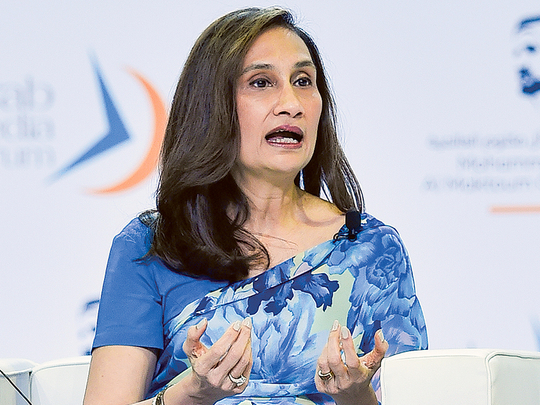
Dubai: Can a more positive narrative be woven into journalistic reporting with a view to promoting a better society? This question was raised today at the Arab Media Forum’s session, Dialogue Between Civilisations, which explored the idea of more positive approaches by media.
On the issue of whether media stokes tensions, a majority of delegates at the session raised their hands in agreement.
This response was disappointing for panellist Shobhana Bhartia, chairperson of the Hindustan Times Group, one of the largest media houses from India, who said that a new online “filter bubble” is skewing the traditional delivery of information.
Tailored online information is limiting people’s views by helping online users weed out data they don’t want to hear or that does not fit into their world view, Bhartia said.
“Media is not a single animal and has been redefined by social media,” Bhartia told the session. “What is happening is that people are getting the kind of opinion they are comfortable with.”
The filter bubble is “completely contradicting what the [traditional] stands for. Your computer has become a mirror. Media’s role is to challenge and promote plurality. How scary is it that we are only getting a one-way view. How myopic.”
Traditional mainstream journalism has long provided a positive influence on its readership via professional, unbiased reporting, she said, that is now acting as a counter-narrative to social media and the so-called new media websites.
Bhartia pointed to the recent incident of a Muslim man being killed in India outside the capital New Delhi based on unfounded rumours that he had consumed beef (cow slaughter and beef consumption are banned in many states in India). After accusations appeared on social media, his house was burnt and he was lynched.
“He was bashed up and killed,” Bhartia said, adding that an inquiry revealed the online fervour was inaccurate and that the man had not in fact consumed beef.
Traditional media reflects India’s secular government and Constitution, which protects the rights of a mosaic of 20 different languages and 400 dialects, she informed.
There are now challenges to the mostly peaceful coexistence between Hindus, Muslims and Buddhists in India since its founding, she said, with “new fault lines” being created in the age of instant posts and messaging on social media which only promise to become more widespread, she said.
Without mainstream media to verify fact, social media contributors, online commentators and bloggers are free to post propaganda and rumours, Bhartia said.
In India, there are “300 to 500 million people going online without even going on to a computer”, Bhartia added.








